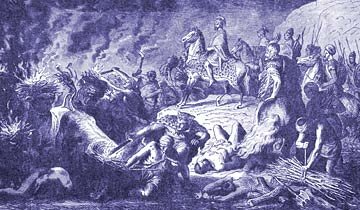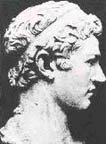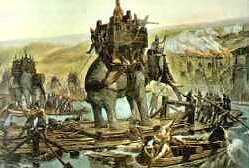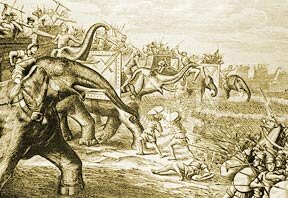 |
 |
 |
|
|
|
|
 |
|||||||
Hamilcar took Hannibal on the Carthaginian expedition to conquer Spain. His father hoped to make up for the losses that Carthage had suffered in the First Punic War against Rome. This taught Hannibal many lessons about fighting, and he became a great warrior. It also focused his desire to conquer Rome. Hannibal's life was one of constant struggle against the Roman republic. From his 18th to his 25th year, Hannibal was in charge of extending the rule of Carthage over Spain for his older brother, Hasdrubal. Hannibal was a successful officer because when his brother, Hasdrubal, was assassinated in 221 BC, the army proclaimed him, at the age of 26, its commander in chief. The Carthaginian government quickly ratified Hannibal's appointment. as commander in chief, Hannibal immediately turned his attention to consolidating the control that Carthage had over Spain. He married a Spanish princess, Imilce, then began to conquer various Spanish tribes and in two years had subjugated all Spain between the Tagus and Iberus (Ebro) rivers, except for the Roman supported city of Saguntum (Sagunto). Saguntum was an independent Spainish city south of the Ebro River. . When Hannibal made an attack on Saguntum In 219 BC, In the treaty between Rome and Carthage was violated. Rome regarded the Carthaginian attack on Saguntum it as an act of war. after Saguntum fell to Hannibal, Rome demanded the surrender of Hannibal. The Carthaginians refused so the Romans declared war on Carthage in 218 BC. This began the Second Punic War. Hannibal's March into Gaul Hannibal decided to fight Rome from the north by going through Spain and Gaul. He left his brother Hasdrubal in command of a huge army for the defense of Spain and North Africa.
When Hannibal crossed the Alps his army was attacked by the Celts that rolled heavy stones down from the heights causing the men and animals to panic and lose their footings on the precipitous paths. Meanwhile, Rome waited in tremendous fear. The Romans had a saying that means 'Hannibal is at the door. The fear of Hannibal became so great that Roman parents would use it as a way to threaten their misbehaving children by saying that Hannibal was coming for them.  Hannibal tried to force the people of Rome out of their city. He had his men tie bundles of tree branches to the heads of cattle. The men lit the branches. The sight and sound of and these poor creatures as they were burned struck great fear into the Romans. But they did not leave the protection of their walled city. Hannibal tried to force the people of Rome out of their city. He had his men tie bundles of tree branches to the heads of cattle. The men lit the branches. The sight and sound of and these poor creatures as they were burned struck great fear into the Romans. But they did not leave the protection of their walled city.This illustrates the psychological impact that Hannibal's presence in Italy had on Roman society. Rome had not been threatened by a military military force since the Gauls had sacked Rome. Another reason for the Roman's fear of Hannibal was his use of elephants, of which the Romans were unfamiliar. Hannibal over ran Italy, burning and killing on his way. He tried very hard to get the Romans to fight a direct battle, however they always evaded him. Hannibal never directly attacked Rome, since it was a high, walled city, he knew it would be useless.
Both Rome and Carthage were decimated by the Second Punic War. Hannibal returned to Carthage and made major improvements to the government. He amended the constitution, cut down the power of the oligarchy, got rid of many corrupt people in the government and placed the citty's finances on sounder footing. He made many enemies through his reforms. They informed Rome that they should demand the surrender of Hannibal in order to keep peace between the two countries. Of course Carthage refused, but Hannibal decided to go into voluntary exile. While he was away, he took poison and died. Hannibal is considered one of the most outstanding and brilliant military geniuses of all time. One can only speculate about what he could have accomplished if he had chosen to improve the quality of life of the Carthaginians, rather than war against Rome for his entire adult life. |


